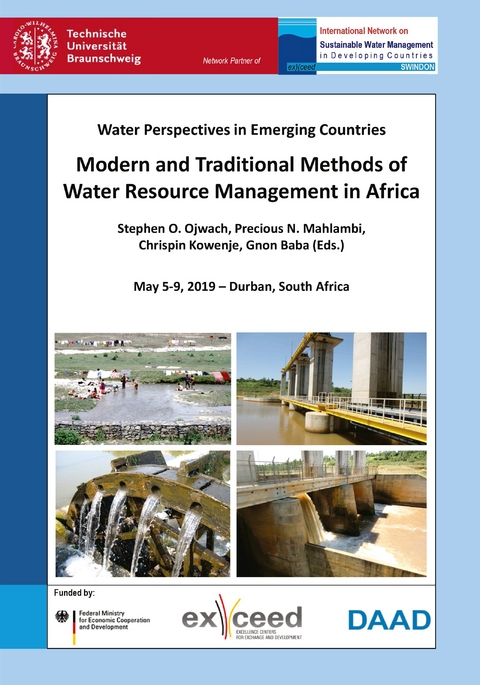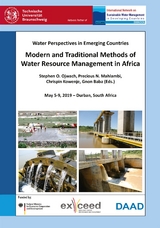Modern and Traditional Methods of Water Resource Management in Africa
Water Perspectives in Emerging Countries. May 5-9, 2019 – Durban, South Africa
Seiten
2019
Cuvillier Verlag
978-3-7369-7041-0 (ISBN)
Cuvillier Verlag
978-3-7369-7041-0 (ISBN)
- Keine Verlagsinformationen verfügbar
- Artikel merken
Water is a key driver of economic and social development, while it also has a basic function in maintaining the integrity of the natural environment. The traditional fragmented approach of dealing with water issues is no longer viable and a hybrid system, which incorporates modern methods, is essential. This is a rational approach that has now been accepted internationally as the way forward for efficient, equitable and sustainable development of the world’s limited but most precious resources.
Finding solutions to these challenging hydric problems requires close collaboration between traditional knowledge and current science practices, expert practitioners, and stakeholders from private and public organizations. Therefore, this book encourages to contribute and to be part of the search for efficient solutions to water crisis in Sub Saharan Africa by widening scientific and technological know-how – and more importantly – engaging in knowledge brokerage. This book focuses on a multi-disciplinary diagnosis of water challenges in developing countries in general but specifically in Sub Saharan Africa, and proposes viable solutions with respect to modern and the traditional methods of water resource management. Specific areas of interest include water quality and quantity parameters, water supply in urban and rural areas, wastewater treatment and recycling.
Water is a key driver of economic and social development, while it also has a basic function in maintaining the integrity of the natural environment. The traditional fragmented approach of dealing with water issues is no longer viable and a hybrid system, which incorporates modern methods, is essential. This is a rational approach that has now been accepted internationally as the way forward for efficient, equitable and sustainable development of the world’s limited but most precious resources.
Finding solutions to these challenging hydric problems requires close collaboration between traditional knowledge and current science practices, expert practitioners, and stakeholders from private and public organizations. Therefore, this book encourages to contribute and to be part of the search for efficient solutions to water crisis in Sub Saharan Africa by widening scientific and technological know-how – and more importantly – engaging in knowledge brokerage. This book focuses on a multi-disciplinary diagnosis of water challenges in developing countries in general but specifically in Sub Saharan Africa, and proposes viable solutions with respect to modern and the traditional methods of water resource management. Specific areas of interest include water quality and quantity parameters, water supply in urban and rural areas, wastewater treatment and recycling.
Finding solutions to these challenging hydric problems requires close collaboration between traditional knowledge and current science practices, expert practitioners, and stakeholders from private and public organizations. Therefore, this book encourages to contribute and to be part of the search for efficient solutions to water crisis in Sub Saharan Africa by widening scientific and technological know-how – and more importantly – engaging in knowledge brokerage. This book focuses on a multi-disciplinary diagnosis of water challenges in developing countries in general but specifically in Sub Saharan Africa, and proposes viable solutions with respect to modern and the traditional methods of water resource management. Specific areas of interest include water quality and quantity parameters, water supply in urban and rural areas, wastewater treatment and recycling.
Water is a key driver of economic and social development, while it also has a basic function in maintaining the integrity of the natural environment. The traditional fragmented approach of dealing with water issues is no longer viable and a hybrid system, which incorporates modern methods, is essential. This is a rational approach that has now been accepted internationally as the way forward for efficient, equitable and sustainable development of the world’s limited but most precious resources.
Finding solutions to these challenging hydric problems requires close collaboration between traditional knowledge and current science practices, expert practitioners, and stakeholders from private and public organizations. Therefore, this book encourages to contribute and to be part of the search for efficient solutions to water crisis in Sub Saharan Africa by widening scientific and technological know-how – and more importantly – engaging in knowledge brokerage. This book focuses on a multi-disciplinary diagnosis of water challenges in developing countries in general but specifically in Sub Saharan Africa, and proposes viable solutions with respect to modern and the traditional methods of water resource management. Specific areas of interest include water quality and quantity parameters, water supply in urban and rural areas, wastewater treatment and recycling.
| Erscheinungsdatum | 27.06.2019 |
|---|---|
| Verlagsort | Göttingen |
| Sprache | englisch |
| Maße | 176 x 250 mm |
| Gewicht | 510 g |
| Themenwelt | Naturwissenschaften ► Biologie ► Ökologie / Naturschutz |
| Wirtschaft ► Volkswirtschaftslehre | |
| Schlagworte | Advanced biological • aquaculture operations • chemical quality, • Chemistry Department • Emerging organic contaminants • Environmental Sanitation • environment and human • Ethiopia • Mathematcial Modelling • Mathematical Modelling • Nanotechnology for Degradation • Organic Compounds • physical-biochemical • quantitative characterization • wastewater • Water procurement • water resource potential • Water Treatment |
| ISBN-10 | 3-7369-7041-2 / 3736970412 |
| ISBN-13 | 978-3-7369-7041-0 / 9783736970410 |
| Zustand | Neuware |
| Haben Sie eine Frage zum Produkt? |
Mehr entdecken
aus dem Bereich
aus dem Bereich




